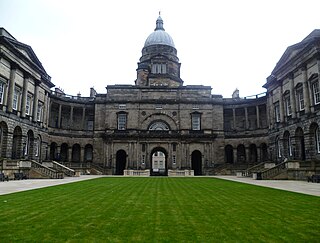
Roman law is the legal system of ancient Rome, including the legal developments spanning over a thousand years of jurisprudence, from the Twelve Tables, to the Corpus Juris Civilis ordered by Eastern Roman emperor Justinian I. Roman law forms the basic framework for civil law, the most widely used legal system today, and the terms are sometimes used synonymously. The historical importance of Roman law is reflected by the continued use of Latin legal terminology in many legal systems influenced by it, including common law.

Aulus Gellius was a Roman author and grammarian, who was probably born and certainly brought up in Rome. He was educated in Athens, after which he returned to Rome. He is famous for his Attic Nights, a commonplace book, or compilation of notes on grammar, philosophy, history, antiquarianism, and other subjects, preserving fragments of the works of many authors who might otherwise be unknown today.
Legal history or the history of law is the study of how law has evolved and why it has changed. Legal history is closely connected to the development of civilisations and operates in the wider context of social history. Certain jurists and historians of legal process have seen legal history as the recording of the evolution of laws and the technical explanation of how these laws have evolved with the view of better understanding the origins of various legal concepts; some consider legal history a branch of intellectual history. Twentieth-century historians viewed legal history in a more contextualised manner - more in line with the thinking of social historians. They have looked at legal institutions as complex systems of rules, players and symbols and have seen these elements interact with society to change, adapt, resist or promote certain aspects of civil society. Such legal historians have tended to analyse case histories from the parameters of social-science inquiry, using statistical methods, analysing class distinctions among litigants, petitioners and other players in various legal processes. By analyzing case outcomes, transaction costs, and numbers of settled cases, they have begun an analysis of legal institutions, practices, procedures and briefs that gives a more complex picture of law and society than the study of jurisprudence, case law and civil codes can achieve.

The Laws of the Twelve Tables was the legislation that stood at the foundation of Roman law. Formally promulgated in 449 BC, the Tables consolidated earlier traditions into an enduring set of laws.

Edinburgh Law School, founded in 1707, is a school within the University of Edinburgh, Scotland, United Kingdom dedicated to research and teaching in law. It is located in the historic Old College, the original site of the University. Two of the twelve currently sitting Supreme Court of the United Kingdom justices are graduates of Edinburgh, including the current President and Deputy President.
Robert Malcolm Ward "Bob" Dixon is a Professor of Linguistics in the College of Arts, Society, and Education and The Cairns Institute, James Cook University, Queensland. He is also Deputy Director of The Language and Culture Research Centre at JCU. Doctor of Letters, he was awarded an Honorary Doctor of Letters Honoris Causa by JCU in 2018. Fellow of British Academy; Fellow of the Australian Academy of the Humanities, and Honorary member of the Linguistic Society of America, he is one of three living linguists to be specifically mentioned in The Concise Oxford Dictionary of Linguistics by Peter Matthews (2014).
David Daube was the twentieth century's preeminent scholar of ancient law. He combined a familiarity with many legal systems, particularly Roman law and biblical law, with an expertise in Greek, Roman, Jewish, and Christian literature, and used literary, religious, and legal texts to illuminate each other and, among other things, to "transform the position of Roman law" and to launch a "revolution" or "near revolution" in New Testament studies.

Thomas Mowbray Charles-Edwards is an emeritus academic at the University of Oxford. He formerly held the post of Jesus Professor of Celtic and is a Professorial Fellow at Jesus College.
Hector Lewis MacQueen is a Scottish academic, a senior scholar of Scots law and legal history, and a former member of the Scottish Law Commission. He is Professor of Private Law at the University of Edinburgh and a former Dean of its Faculty of Law. He is author, co-author and editor of a large number books on Scottish law and legal history, including the 11th, 12th, 13th and 14th editions of the standard text Gloag & Henderson Law of Scotland, and is former Literary Director of the Stair Society. Stetson University College of Law, Florida, appointedway. He is currently a member of the International Advisory Group for the JKLH-funded project, 'The Paradox of Medieval Scotland, 1093-1286'. In 1995 he became a Fellow of The Royal Society of Edinburgh.

Simon Corcoran is a British ancient historian and lecturer in ancient history within the School of History, Classics and Archaeology, Newcastle University.
A fideicommissum is a type of bequest in which the beneficiary is encumbered to convey parts of the decedent's estate to someone else. For example, if a father leaves the family house to his firstborn, on condition that she will it to her first child. It was one of the most popular legal institutions in ancient Roman Law for several centuries. The word is a conjunction of the Latin words fides (trust) and committere, and thus denotes that something is committed to one's trust.

The Kingdom of Scotland was a sovereign state in northwest Europe traditionally said to have been founded in 843. Its territories expanded and shrank, but it came to occupy the northern third of the island of Great Britain, sharing a land border to the south with the Kingdom of England. It suffered many invasions by the English, but under Robert the Bruce it fought a successful War of Independence and remained an independent state throughout the late Middle Ages. Following the annexation of the Hebrides and the Northern Isles from the Kingdom of Norway in 1266 and 1472 respectively, and the final capture of the Royal Burgh of Berwick by the Kingdom of England in 1482, the territory of the Kingdom of Scotland corresponded to that of modern-day Scotland, bounded by the North Sea to the east, the Atlantic Ocean to the north and west, and the North Channel and Irish Sea to the southwest. In 1603, James VI of Scotland became King of England, joining Scotland with England in a personal union. In 1707, the two kingdoms were united to form the Kingdom of Great Britain under the terms of the Acts of Union.
Medieval Roman law is the continuation and development of ancient Roman law that developed in the European Late Middle Ages. Based on the ancient text of Roman law, Corpus iuris civilis, it added many new concepts, and formed the basis of the later civil law systems that prevail in the vast majority of countries.
In Roman law, contracts could be divided between those in re, those that were consensual, and those that were innominate contracts in Roman law. Although Gaius only identifies a single type of contract in re, it is commonly thought that there were four, as Justinian identifies: mutuum, commodatum, depositum (deposit) and pignus (pledge).
Wolfgang Hermann Wernher Ernst is a German lawyer and Regius Professor of Civil Law at the University of Oxford.
Caroline Humfress, FRHS, FSLS, is a legal historian who is professor at the University of St Andrews and Director of its Institute of Legal and Constitutional Research.
Suzanne Dixon is an Australian classical scholar, widely recognised as an authority on women's history and particularly marriage and motherhood.
Jane F. Gardner is a Roman historian, academic, and museum curator. She is emerita professor of Roman History at University of Reading, specialising in Roman law and Roman social history. She was a professor at the university from 1993 until her retirement in 1999, having taught there since 1963. She was curator of the Ure Museum of Greek Archaeology from 1976 to 1992.

Sinclair Wynn Bell is an American classical archaeologist and art historian. He is a Professor of Art History at Northern Illinois University where he teaches courses in Greek, Etruscan, and Roman art history, architecture, and archaeology, as well as museum studies. His research focuses on the art and archaeology of the Etruscans; sport and spectacle in the Roman imperial period, especially the Roman circus; and slavery in ancient Rome, especially the visual representation of slaves, freedmen, and foreigners in Roman art.







